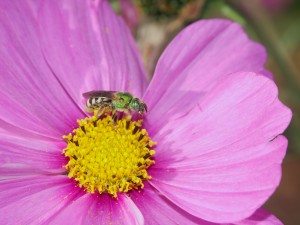Discovering Native Bees

Originally appears in the Summer 2011 issue
Natural systems provide humans with a variety of services essential to our survival. Ecosystem services such as climate regulation, water purification, oxygen production, waste treatment and detoxification, flood prevention, and pollination are provided at no cost, yet their true value is immeasurable. In our economy-driven world, these systems are often taken for granted, and as a consequence many are in peril. Understanding their role is a critical first step towards ensuring that they endure.
Pollination, the process of moving pollen grains from one flower to another to stimulate fruit and seed production, is among the easiest of these services to understand. Pollination is important for successful reproduction of all flowering plant species, both wild and cultivated. It allows intact ecosystems to continue functioning efficiently, and it provides food and other products for human consumption. Despite its importance, pollinators have been declining in number over the past two decades.
Although some plants, including most major cereal crops (corn, rice, wheat, barley, and oats) rely on wind dispersal for pollination, 70 to 90 percent of flowering plants rely on animal pollinators. These plants include fruits and vegetables consumed by humans and other animals. Without pollinators to facilitate pollen transfer, these plants will cease to produce fruit altogether.
This content is restricted to subscribers only.
If you are not yet a subscriber, please consider taking out a subscription here.
If you are an existing subscriber, kindly log in or contact us at info@greenteacher.com for more information.





